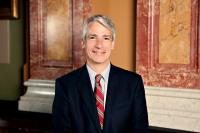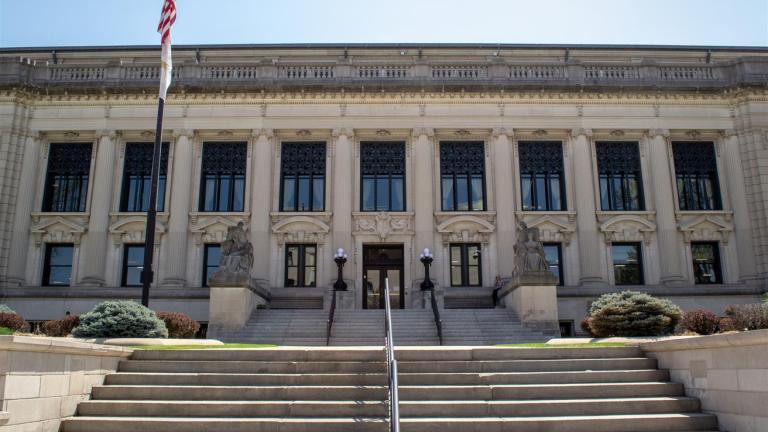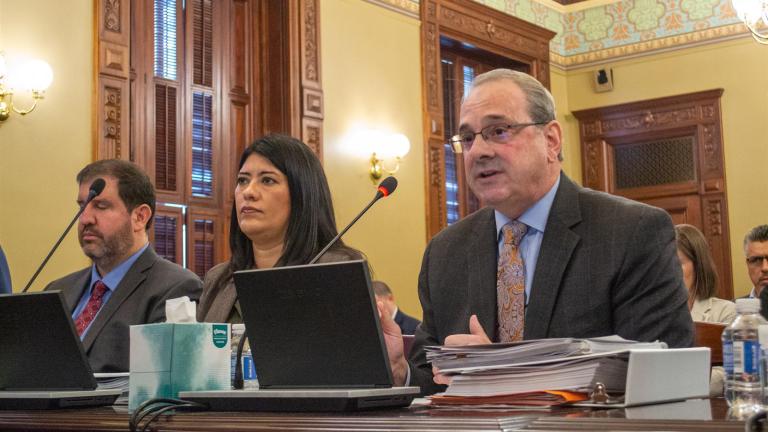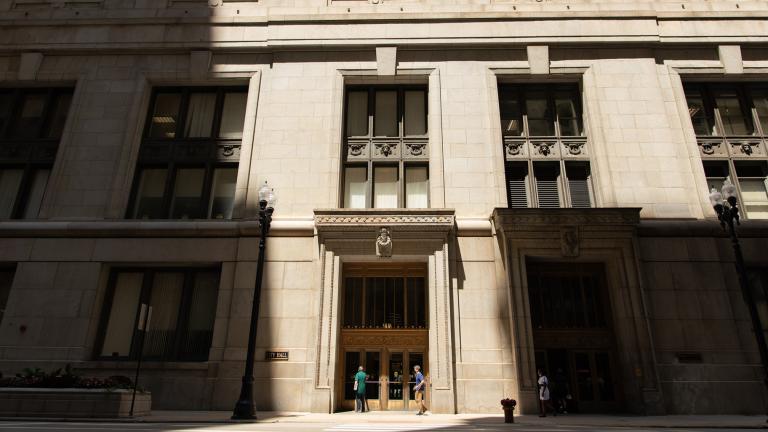The Illinois Supreme Court overturned the state’s landmark pension reform law, which was passed in 2013 by then-Gov. Pat Quinn. The law attempted to solve the state’s $100 billion unfunded liability over the next 30 years, primarily by reducing retiree annual cost-of-living raises. Last November, the law was found unconstitutional and “void in its entirety,” by Sangamon County Court Judge John Belz. That ruling was upheld by a unanimous decision Friday by the Illinois Supreme Court.
Chicago Tonight hosts a special 30-minute edition on the ruling. Joining us are state Rep. Tom Morrison (54th District), the Republican spokesperson for the House Personnel and Pension Committee, and state Rep. Elaine Nekritz (57th District), a Democrat who is an assistant Majority Leader and is the Chair of the House Personnel and Pensions Committee. Following the discussion with Morrison and Nekritz, we’ll get analysis from a panel of political reporters.
Panel
Dan Mihalopoulos, Chicago Sun-Times
Karen Pierog, Reuters
Amanda Vinicky, Illinois Public Radio
Paris Schutz, Chicago Tonight
Read statements from legislators and organizations.
State Rep. Elaine Nekritz (D-Northbrook):
“Our goal from the beginning of our work on pension reform has been to strike a very careful, very important balance between protecting the hard-earned investments of state workers and retirees and the equally important investments of all taxpayers in education, human and social services, health care and other vital state priorities. In its ruling today, the Supreme Court struck down not only the law but the core of that balance. Now our already dire pension problem will get that much worse and our options in striking that balance are limited. Our path forward from here is now much more difficult, and every direction will be more painful than the balance we struck in Senate Bill 1."
Illinois AFL-CIO president Michael T. Carrigan issued the following statement on behalf of the We Are One Illinois coalition of unions that represent public employees and retirees:
“We are thankful that the Supreme Court has unanimously upheld the will of the people, overturned this unfair and unconstitutional law, and protected the hard-earned life savings of teachers, police, fire fighters, nurses, caregivers and other public service workers and retirees.
The Court’s ruling confirms that the Illinois Constitution ensures against the government’s unilateral diminishment or impairment of public pensions.
Because most public employees aren’t eligible for Social Security, their modest pension—just $32,000 a year on average—is the primary source of retirement income for hundreds of thousands of Illinois families. While workers always paid their share, politicians caused the debt by failing to make adequate contributions to the pension funds.
Public service workers are helpers and problem solvers by trade. With the Supreme Court’s unanimous ruling, we urge lawmakers to join us in developing a fair and constitutional solution to pension funding, and we remain ready to work with anyone of good faith to do so.”
The Illinois Policy Institute issued the following statement:
“Illinois’ political elite have devised a pension scheme that is excessive, bloated, corrupted and was never affordable for Illinois taxpayers. While Senate Bill 1 did not solve the pension crisis, the legislation at least took a first step toward achieving parity between government workers who receive pensions, and the taxpayers who fund them.
But with today’s ruling, the state's high court says that state government’s No. 1 financial responsibility is paying the retirement of people who no longer work for state government. Pension costs are first in line, ahead of funding for public safety, education, helping the poor and disadvantaged, and all core services provided by state government.
The court’s ruling suggested that raising taxes is a way to pay for pensions. Raising taxes will not fix a broken system. The pension system is beyond repair, and there will never be enough money to fund it. Case in point: The 2011 tax increase. That tax increase generated more than $31 billion, and 90 cents out of every $1 collected from the tax increase went to pensions. Yet it still was not enough to make the pension system whole.
Ultimately, the only way Illinois can break the cycle of siphoning more and more tax dollars and sacrificing more and more state programs to pay for pensions is to follow the lead of the private sector and move new employees to a 401(k)-style system. In the short term, it will not be surprising to see calls to change the state constitution or allow Illinois to file for bankruptcy.”
A spokesperson for Gov. Bruce Rauner issued the following statement:
“The Supreme Court’s decision confirms that benefits earned cannot be reduced. That’s fair and right, and why the governor long maintained that SB 1 is unconstitutional. What is now clear is that a Constitutional Amendment clarifying the distinction between currently earned benefits and future benefits not yet earned, which would allow the state to move forward on common-sense pension reforms, should be part of any solution.”
Mayor Rahm Emanuel issued the following statement:
“Since taking office, our goal has been to find a solution to Chicago’s pension crisis that protects taxpayers while ensuring the retirements of our workers are preserved -- something we achieved with Chicago’s pension reform for the Municipal and Laborers funds. That reform is not affected by today’s ruling, as we believe our plan fully complies with the State constitution because it fundamentally preserves and protects worker pensions rather than diminishing or impairing them. While the State plan only reduced benefits, the City’s plan substantially increases City funding which will save both funds from certain insolvency within the next ten to fifteen years and ensure they are secured over the long-term. Further, unlike the State plan, the City’s plan was the result of negotiation and partnership with 28 impacted unions to protect the retirements of the 61,000 city workers and retirees in these funds and ensure they will receive the pensions promised to them.”
Illinois House Republican Leader Jim Durkin issued the following statement:
“I respect the Illinois Supreme Court, but disagree with the ruling. I am prepared to continue working on meaningful legislative reforms to save our public pension systems.”
Civic Committee of the Commercial Club of Chicago President Ty Fahner issued the following statement:
“There are no winners today. If there’s any good news, it’s that Chicago and Illinois are resilient, and we’ve responded to great challenges before. The Civic Committee stands ready to work with Governor Rauner and the General Assembly to craft a bipartisan solution to rescue the state from financial collapse and restore Illinois as a compassionate and competitive state.”
Moody's Investors Service released the following statement:
"Moody’s is currently reviewing the Illinois Supreme Court pension reform decision and analyzing its potential impact on the credit condition of the State of Illinois, the City of Chicago, public universities, and other Illinois municipalities and school districts. For the state, Moody’s current rating and outlook did not factor in the proposed pension reforms, but the ruling provides additional evidence that pension benefit reductions will not be permitted."










